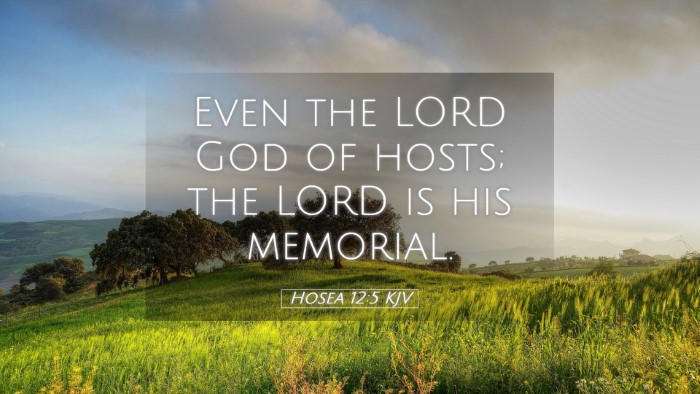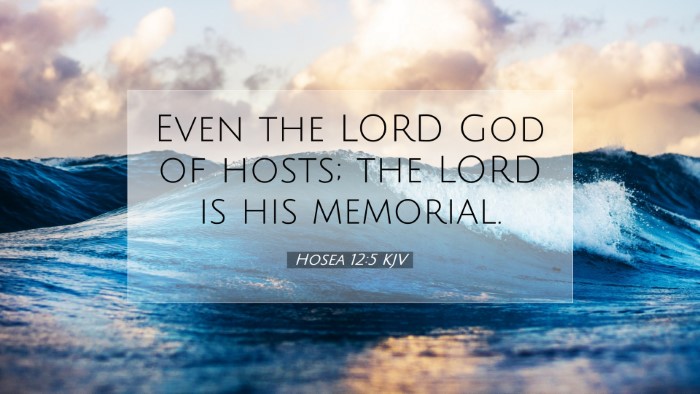Old Testament
Genesis Exodus Leviticus Numbers Deuteronomy Joshua Judges Ruth 1 Samuel 2 Samuel 1 Kings 2 Kings 1 Chronicles 2 Chronicles Ezra Nehemiah Esther Job Psalms Proverbs Ecclesiastes Song of Solomon Isaiah Jeremiah Lamentations Ezekiel Daniel Hosea Joel Amos Obadiah Jonah Micah Nahum Habakkuk Zephaniah Haggai Zechariah MalachiHosea 12:5
Hosea 12:5 KJV
Even the LORD God of hosts; the LORD is his memorial.
Hosea 12:5 Bible Commentary
Bible Commentary on Hosea 12:5
Verse: "Even the Lord, the God of hosts; the Lord is his memorial." (Hosea 12:5)
Introduction
The book of Hosea serves as an essential component of Old Testament prophetic literature, representing God's profound commitment to His people amidst their infidelities. Hosea 12:5 captures a pivotal moment in the narrative, drawing attention to the Lord's attributes and covenantal faithfulness. This commentary synthesizes insights from prominent public domain scholars including Matthew Henry, Albert Barnes, and Adam Clarke, providing a multi-faceted analysis of this verse.
Contextual Background
In Hosea's time, Israel was deeply entrenched in idolatry and social injustice. Despite these sins, God, through Hosea, calls the people back to a life of remembrance and obedience. The verse emphasizes God's sovereignty and the importance of remembrance in the relationship between God and His people.
Matthew Henry's Insights
Matthew Henry explains that the mention of "Lord" signifies God's supreme authority and covenantal relationship. He emphasizes the phrase "the God of hosts" which denotes God’s command over all creation and the heavenly armies. Henry highlights that this reflects the might of God and His ability to protect and defend His people.
Henry further notes the significance of God being a "memorial" – it illustrates that God’s name and deeds should always be remembered by His people. This serves as a call to worship and acknowledgment of His faithfulness, implying that in times of trouble, remembrance of God’s past deeds can lead to renewed trust and hope.
Albert Barnes's Commentary
Albert Barnes interprets this verse as a reminder of the immutable character of God. He points out that the term "hosts" signifies God's power over both earthly and heavenly realms. Barnes articulates that the memorial nature of God implies that He is to be remembered for His mercies and judgments alike.
Moreover, Barnes highlights that recognizing the Lord in His fullness encourages believers to remain steadfast in their faith. God as a "memorial" suggests that the acts of God, particularly His deliverance and faithfulness, should remain central in the lives of His followers, promoting a deeper relationship founded on trust and remembrance.
Adam Clarke's Observations
Adam Clarke focuses on the implications of God’s sovereignty expressed in the title "the Lord of Hosts." He underlines that this designation encourages both awe and reverence towards God, suggesting the power available to His believers. Clarke discusses that God’s memory must be foundational in the lives of His followers, encouraging them to keep God’s covenant ever before them, as a form of spiritual discipline and remembrance.
Clarke elaborates on the theological significance of the phrase "the Lord is his memorial," describing it as a profound reminder not only of past deliverances but also of God’s eternal nature. It emphasizes an understanding that God's identity is intimately tied to His acts and the historical realities of His people, thus fostering an attitude of gratitude and worship.
Theological Implications
Combining the insights from these scholars, one can conclude that Hosea 12:5 communicates profound theological truths about the nature of God:
- Sovereignty: God is the ultimate authority, ruling over all creation and ensuring His purposes are accomplished.
- Faithfulness: God's commitments and covenants remain unchanged, serving as a source of assurance for believers.
- Remembrance: The act of remembering God and His deeds is critical in maintaining a faithful relationship, encouraging obedience and worship.
Practical Applications
For pastors and theologians, Hosea 12:5 provides a framework for understanding the continuity of God's character across the biblical narrative. Leaders can use this verse to remind congregations about the importance of recalling God's faithfulness in their lives, particularly during difficult circumstances. Teaching on the significance of God's memorial can cultivate a deeper prayer life, where believers consistently acknowledge God's past provisions and express their trust in His ongoing care.
Students and scholars can delve into a more profound exploration of the covenantal themes within Hosea, understanding how they relate to New Testament developments of God's faithfulness through Christ. Engaging with this verse encourages critical thinking about how theology intersects with practical Christian living.
Conclusion
In sum, Hosea 12:5 is rich with significance. It not only encapsulates the character of God but also deepens our understanding of how His nature impacts our lives as believers. The insights from Matthew Henry, Albert Barnes, and Adam Clarke guide us in recognizing the importance of elevating God’s sovereignty and faithfulness in our remembrance, fostering a life that honors the Lord of Hosts continually.


